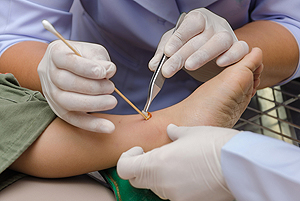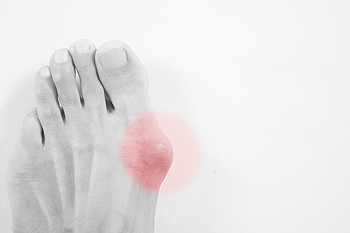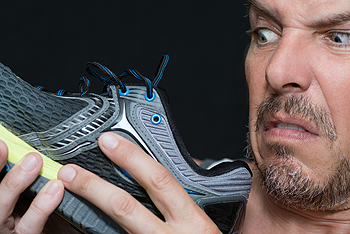 Wound care is generally a familiar concern for diabetic patients. When the insulin levels are elevated for an extended period of time, there may be a loss of feeling as a result of neuropathy. A small cut or scrape on the foot may have the potential of developing into a dangerous wound, and prompt treatment is necessary in possibly preventing a painful foot ulcer. Proper treatment may begin with cleaning the affected area thoroughly, followed by applying an antibiotic cream. It is important the wound is covered, and this may help to prevent bacteria from multiplying at the site of the foot ulcer. If you are affected by diabetes, it is strongly suggested that you are under the care of a podiatrist who can help this condition.
Wound care is generally a familiar concern for diabetic patients. When the insulin levels are elevated for an extended period of time, there may be a loss of feeling as a result of neuropathy. A small cut or scrape on the foot may have the potential of developing into a dangerous wound, and prompt treatment is necessary in possibly preventing a painful foot ulcer. Proper treatment may begin with cleaning the affected area thoroughly, followed by applying an antibiotic cream. It is important the wound is covered, and this may help to prevent bacteria from multiplying at the site of the foot ulcer. If you are affected by diabetes, it is strongly suggested that you are under the care of a podiatrist who can help this condition.
Wound care is an important part in dealing with diabetes. If you have diabetes and a foot wound or would like more information about wound care for diabetics, consult with one of our podiatrists from Family Foot & Ankle Center. Our doctors will assess your condition and provide you with quality foot and ankle treatment.
What Is Wound Care?
Wound care is the practice of taking proper care of a wound. This can range from the smallest to the largest of wounds. While everyone can benefit from proper wound care, it is much more important for diabetics. Diabetics often suffer from poor blood circulation which causes wounds to heal much slower than they would in a non-diabetic.
What Is the Importance of Wound Care?
While it may not seem apparent with small ulcers on the foot, for diabetics, any size ulcer can become infected. Diabetics often also suffer from neuropathy, or nerve loss. This means they might not even feel when they have an ulcer on their foot. If the wound becomes severely infected, amputation may be necessary. Therefore, it is of the upmost importance to properly care for any and all foot wounds.
How to Care for Wounds
The best way to care for foot wounds is to prevent them. For diabetics, this means daily inspections of the feet for any signs of abnormalities or ulcers. It is also recommended to see a podiatrist several times a year for a foot inspection. If you do have an ulcer, run the wound under water to clear dirt from the wound; then apply antibiotic ointment to the wound and cover with a bandage. Bandages should be changed daily and keeping pressure off the wound is smart. It is advised to see a podiatrist, who can keep an eye on it.
If you have any questions, please feel free to contact one of our offices located in Raleigh and Henderson, NC . We offer the newest diagnostic and treatment technologies for all your foot care needs.
Read more about Wound Care A bony protrusion on the bottom of the big toe may be indicative of a bunion. It develops as a result of wearing shoes that do not have enough room for the toes to move freely in, or it may come from certain genetic factors. They can cause severe pain and discomfort, and in certain cases, surgery may be necessary for permanent relief. Patients may be eligible for surgery if there is consistent pain while performing daily activities, or if you are unable to straighten or bend your big toe. There are specific types of bunion surgery. An osteotomy consists of cutting the joint in the big toe, and aligning it to it’s normal placement. An exostectomy is performed when the bunion is removed from the joint, and an alignment is not necessary. If metal plates are needed to correct the deformity, an arthrodesis may be performed. If you have a bunion, please consult with a podiatrist who can help you to determine if bunion surgery is correct for you.
A bony protrusion on the bottom of the big toe may be indicative of a bunion. It develops as a result of wearing shoes that do not have enough room for the toes to move freely in, or it may come from certain genetic factors. They can cause severe pain and discomfort, and in certain cases, surgery may be necessary for permanent relief. Patients may be eligible for surgery if there is consistent pain while performing daily activities, or if you are unable to straighten or bend your big toe. There are specific types of bunion surgery. An osteotomy consists of cutting the joint in the big toe, and aligning it to it’s normal placement. An exostectomy is performed when the bunion is removed from the joint, and an alignment is not necessary. If metal plates are needed to correct the deformity, an arthrodesis may be performed. If you have a bunion, please consult with a podiatrist who can help you to determine if bunion surgery is correct for you.
Foot surgery is sometimes necessary to treat a foot ailment. To learn more, contact one of our podiatrists of Family Foot & Ankle Center. Our doctors will assist you with all of your foot and ankle needs.
When Is Surgery Necessary?
Foot and ankle surgery is generally reserved for cases in which less invasive, conservative procedures have failed to alleviate the problem. Some of the cases in which surgery may be necessary include:
What Types of Surgery Are There?
The type of surgery you receive will depend on the nature of the problem you have. Some of the possible surgeries include:
Benefits of Surgery
Although surgery is usually a last resort, it can provide more complete pain relief compared to non-surgical methods and may allow you to finally resume full activity.
Surgical techniques have also become increasingly sophisticated. Techniques like endoscopic surgery allow for smaller incisions and faster recovery times.
If you have any questions please feel free to contact one of our offices located in Raleigh and Henderson, NC . We offer the newest diagnostic and treatment technologies for all your foot and ankle needs.
Read more about Foot and Ankle Surgery Patients who are obese may have foot problems as a result of the additional weight that is carried by the feet. A common foot condition that may arise because of obesity is known as plantar fasciitis, which is an inflammation of the plantar fascia. The ankles may undergo stress that is put on the bones, ligaments, and tendons as a result of additional weight that is carried. This may increase the risk of falling, as well as increase the occurrence of ankle sprains. Another common condition linked to obesity is known as tibial tendonitis, which may cause the foot to roll inward while walking, leading to ankle pain. If you are having any type of foot pain as a result of being overweight, it is advised that you consult with a podiatrist as quickly as possible, who can offer relief through proper treatment options.
Patients who are obese may have foot problems as a result of the additional weight that is carried by the feet. A common foot condition that may arise because of obesity is known as plantar fasciitis, which is an inflammation of the plantar fascia. The ankles may undergo stress that is put on the bones, ligaments, and tendons as a result of additional weight that is carried. This may increase the risk of falling, as well as increase the occurrence of ankle sprains. Another common condition linked to obesity is known as tibial tendonitis, which may cause the foot to roll inward while walking, leading to ankle pain. If you are having any type of foot pain as a result of being overweight, it is advised that you consult with a podiatrist as quickly as possible, who can offer relief through proper treatment options.
The more you weigh, the harder your feet must work to support your body. If you’re an obese individual and are concerned about your feet, contact one of our podiatrists from Family Foot & Ankle Center. Our doctors can provide the care you need to keep you pain-free and on your feet.
Obesity and Your Feet
People who are overweight are putting more pressure on their ankles, knees, and hips as well as their feet. This unfortunately can lead to variety of different issues.
Problems & Complications Stemming from Obesity
If you have any questions, please feel free to contact one of our offices located in Raleigh and Henderson, NC . We offer the newest diagnostic and treatment technologies for all your foot care needs.
Read more about Obesity and the Feet When the feet sweat continuously, it may be a condition that is known as plantar hyperhidrosis. Sweaty feet can be uncomfortable and may lead to bacterial and fungal infections. It is beneficial to wear socks and shoes that are made from a breathable material, which may help to control any odor that can come from the feet. Research has indicated that walking barefoot as often as possible may help to manage this condition, in addition to refraining from wearing the same pair of shoes for two days in a row. Some patients find it helpful to use an antiperspirant on their feet, as well as wear insoles that can absorb the sweat. If you are suffering from this condition, it is strongly suggested that you consult with a podiatrist who can help you to control plantar hyperhidrosis.
When the feet sweat continuously, it may be a condition that is known as plantar hyperhidrosis. Sweaty feet can be uncomfortable and may lead to bacterial and fungal infections. It is beneficial to wear socks and shoes that are made from a breathable material, which may help to control any odor that can come from the feet. Research has indicated that walking barefoot as often as possible may help to manage this condition, in addition to refraining from wearing the same pair of shoes for two days in a row. Some patients find it helpful to use an antiperspirant on their feet, as well as wear insoles that can absorb the sweat. If you are suffering from this condition, it is strongly suggested that you consult with a podiatrist who can help you to control plantar hyperhidrosis.
If you are suffering from hyperhidrosis contact one of our podiatrists of Family Foot & Ankle Center. Our doctors can provide the care you need to attend to all of your foot and ankle needs.
Hyperhidrosis of the Feet
Hyperhidrosis is a rare disorder that can cause people to have excessive sweating of their feet. This can usually occur all on its own without rigorous activity involved. People who suffer from hyperhidrosis may also experience sweaty palms.
Although it is said that sweating is a healthy process meant to cool down the body temperature and to maintain a proper internal temperature, hyperhidrosis may prove to be a huge hindrance on a person’s everyday life.
Plantar hyperhidrosis is considered to be the main form of hyperhidrosis. Secondary hyperhidrosis can refer to sweating that occurs in areas other than the feet or hands and armpits. Often this may be a sign of it being related to another medical condition such as menopause, hyperthyroidism and even Parkinson’s disease.
In order to alleviate this condition, it is important to see your doctor so that they may prescribe the necessary medications so that you can begin to live a normal life again. If this is left untreated, it is said that it will persist throughout an individual’s life.
A last resort approach would be surgery, but it is best to speak with your doctor to find out what may be the best treatment for you.
If you have any questions please feel free to contact one of our offices located in Raleigh and Henderson, NC . We offer the newest diagnostic and treatment technologies for all your foot and ankle needs.
Read more about Hyperhidrosis of the Feet